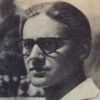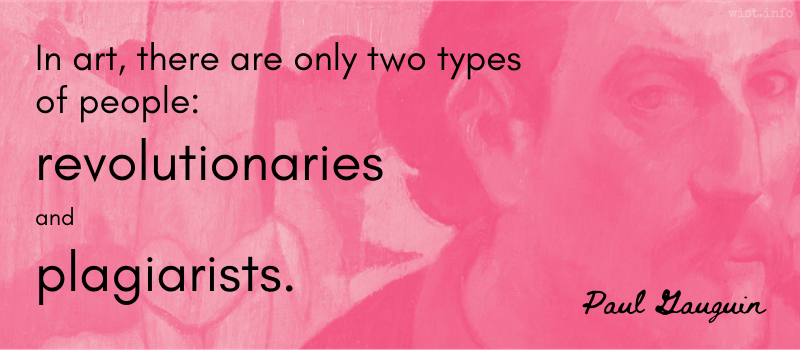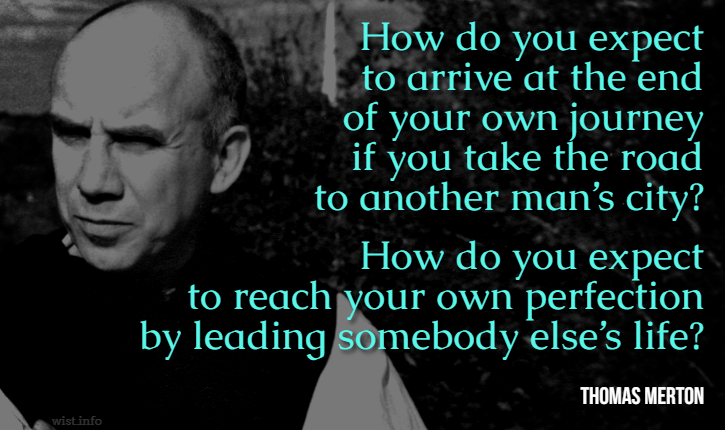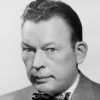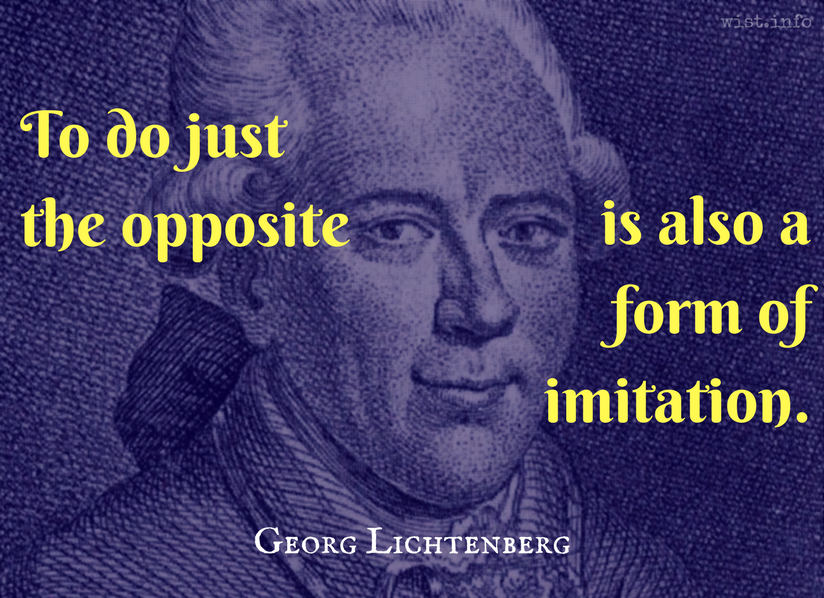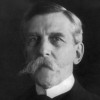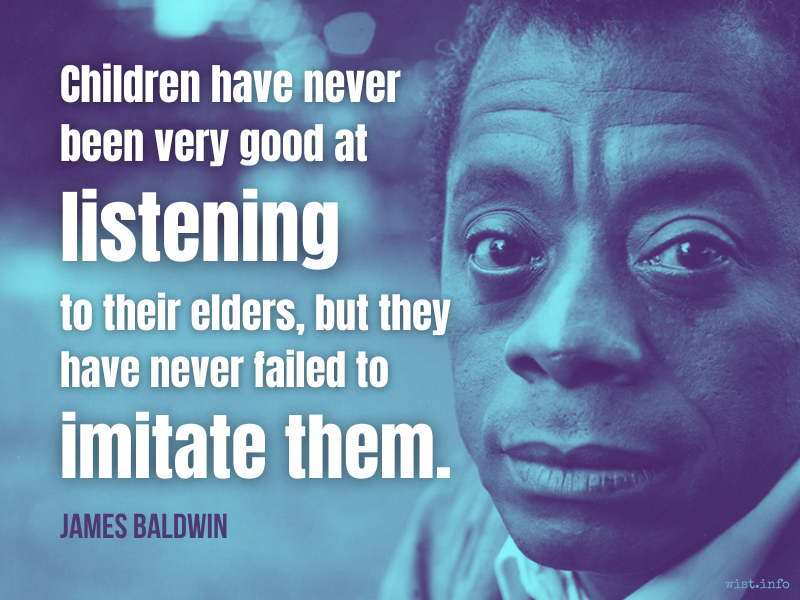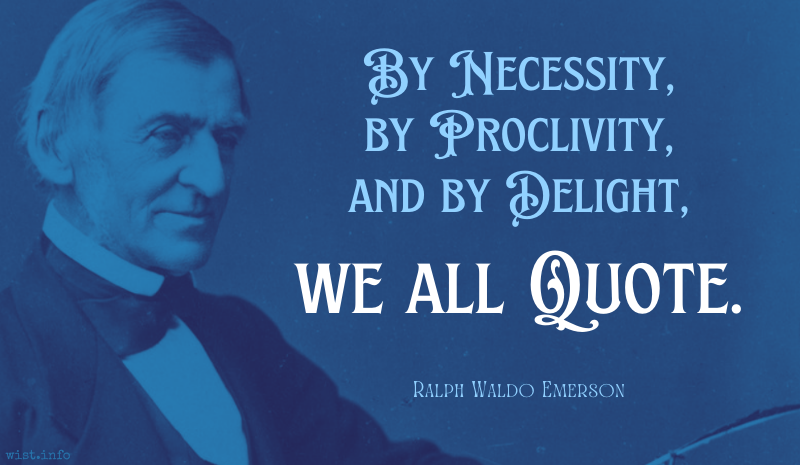The challenge of manners is not so much to be nice to someone whose favor and/or person you covet (although more people need to be reminded of that necessity than one would suppose) as to be exposed to the bad manners of others without imitating them.
Quotations about:
imitation
Note not all quotations have been tagged, so Search may find additional quotes on this topic.
Imitation is the sincerest of flattery.
Charles Caleb "C. C." Colton (1780-1832) English cleric, writer, aphorist
Lacon: Or, Many Things in Few Words, Vol. 1, § 217 (1820)
(Source)
This reference predates by several decades the (attributed) Oscar Wilde, "Imitation is the sincerest form of flattery that mediocrity can pay to greatness" (1880s) though a variety of thematically similar quotations came about in the interim. By the 1850s "form" had been soundly fit into the common phrase.
More discussion here: Quote Origin: Imitation Is the Sincerest Form of Flattery That Mediocrity Can Pay To Greatness – Quote Investigator®.
We may define all the essentials of politeness, but we cannot determine how and where they should be used; they depend on ordinary habits and customs, are connected with times and places, and are not the same in both sexes nor in different ranks of life; intelligence alone cannot find this out; politeness is acquired and perfected by imitation.
[L’on peut définir l’esprit de politesse, l’on ne peut en fixer la pratique: elle suit l’usage et les coutumes reçues; elle est attachée aux temps, aux lieux, aux personnes, et n’est point la même dans les deux sexes, ni dans les différentes conditions; l’esprit tout seul ne la fait pas deviner: il fait qu’on la suit par imitation, et que l’on s’y perfectionne.]Jean de La Bruyère (1645-1696) French essayist, moralist
The Characters [Les Caractères], ch. 5 “Of Society and Conversation [De la Société et de la Conversation],” § 32 (5.32) (1688) [tr. Van Laun (1885)]
(Source)
(Source (French)). Alternate translations:
We may define Politeness, tho we can't tell where to fix it in practice. It observes received Uses and Customs, 'tis bound to times and places, and is not the same thing in the two Sexes, or in different conditions. Wit alone cannot attain it: 'tis acquired and compleated by Imitation.
[Bullord ed. (1696)]
We may define Politeness, tho we can't tell where to fix it in Practice. It observes receiv'd Uses and Customs, is bound to Times and Places, and is nto the same thing in the two Sexes, or in different Conditions; Wit alone cannot attain it, 'tis acquir'd and brought to perfection by imitation.
[Curll ed. (1713)]
It is possible to define the spirit of politeness, but not to lay down rules for its practice: it depends on custom and convention; it is related to periods and places and people, and it is not the same for the two sexes nor for various social conditions; one cannot attain it through intelligence alone, yet intelligence can enable one to imitate it, and to acquire perfection in it.
[tr. Stewart (1970)]
The essence of success is that it is never necessary to think of a new idea oneself. It is far better to wait until somebody else does it, and then to copy him in every detail, except his mistakes.
Aubrey Menen (1912-1989) British writer, novelist, satirist, theatre critic
The Abode of Love, Part 3, “The Random Wooings” (1956)
(Source)
In art, there are only two types of people: revolutionaries and plagiarists. And in the end, doesn’t the revolutionary’s work become official, once the State takes it over?
Paul Gauguin (1848-1903) French painter [Eugène Henri Paul Gauguin]
Letter in Le Soir (25 Apr 1895)
Collected in Daniel Guérin, ed., The Writings of a Savage (1996) [tr. Levieux].
Often given as "Art is either plagiarism or revolution," or sometimes "Art is either a revolutionist or a plagiarist." This is often cited from James Huneker, The Pathos of Distance (1913), but there it is given as a paraphrase: "Paul Gauguin has said that in art one is either a plagiarist or a revolutionary."
(Huneker's book elsewhere contains the parallel paraphrase, "Paul Gauguin has said that all artists are either revolutionists or reactionists.")
A guy walks up to me and asks “What’s Punk?”
So I kick over a garbage can and say “That’s Punk!”
So he kicks over the garbage can and says “That’s Punk?”
And I say “No that’s trendy!”Billie Joe Armstrong (b. 1972) American singer, songwriter, musician
In Matt Doeden, Green Day: Keeping Their Edge (2006)
(Source)
How do you expect to arrive at the end of your own journey if you take the road to another man’s city? How do you expect to reach your own perfection by leading somebody else’s life?
Thomas Merton (1915-1968) French-American religious and writer [a.k.a. Fr. M. Louis]
New Seeds of Contemplation, ch. 14 “Integrity” (1962)
(Source)
Imitation is the sincerest form of television.
Fred Allen (1894-1956) American humorist [b. John Florence Sullivan]
(Attributed)
Sometimes attributed to Steve Allen. See Colton.
To do exactly the opposite of something is also a form of imitation, namely an imitation of its opposite.
Georg C. Lichtenberg (1742-1799) German physicist, writer
Aphorisms, Notebook D, #96 [p. 604] (1773-75) [tr. Tester (2012)]
(Source)
Alternate translations:
- "To do just the opposite is also a form of imitation." [tr. Mautner and Hatfield]
- "To do the opposite of something is also a form of imitation, namely an imitation of its opposite." [tr. Hollingdale (1990)]
Children will imitate their fathers in their vices, seldom in their repentance.
Charles Spurgeon (1834-1892) British Baptist preacher, author [Charles Haddon (C.H.) Spurgeon]
Spurgeon’s Sermons, 3rd Series, Sermon 21, “Manasseh” (1883)
(Source)
Most of the things we do, we do for no better reason than that our fathers have done them or our neighbors do them, and the same is true of a larger part than what we suspect of what we think.
FLUELLEN: If the enemy is an ass and a fool and a prating coxcomb, is it meet, think you, that we should also, look you, be an ass and a fool and a prating coxcomb, in your own conscience now?
William Shakespeare (1564-1616) English dramatist and poet
Henry V, Act 4, sc. 1, l. 80ff (4.1.80-83) (1599)
(Source)
Example has more followers than reason. We unconsciously imitate what pleases us, and insensibly approximate to the characters we most admire. In this way, a generous habit of thought and of action carries with it an incalculable influence.
Christian Nestell Bovee (1820-1904) American epigrammatist, writer, publisher
Intuitions and Summaries of Thought, Vol. 1, “Example” (1862)
(Source)
Almost all absurdity of conduct arises from the imitation of those whom we cannot resemble.
Samuel Johnson (1709-1784) English writer, lexicographer, critic
The Rambler, #135 (2 Jul 1751)
(Source)
All you learn and all you can read will be of little use to you if you do not think and reason upon it yourself. One reads to know other people’s thoughts, but if we take them upon trust, without examining and comparing them with our own, it is really living upon other people’s scraps or retailing other people’s goods. To know the thoughts of others, is of use, because it suggests thoughts to one’s self, and helps one to form a judgment; but to repeat other people’s thoughts, without considering whether they are right or wrong, is the talent only of a parrot, or at most a player.
Lord Chesterfield (1694-1773) English statesman, wit [Philip Dormer Stanhope]
Letter to his son, #67, “Thursday” (1740-41)
(Source)
We are, in truth, more than half what we are by imitation. The great point is, to choose good models and to study them with care.
Lord Chesterfield (1694-1773) English statesman, wit [Philip Dormer Stanhope]
Letter to his son, #214 (18 Jan 1750)
(Source)
When people are free to do as we please, they usually imitate each other.
Eric Hoffer (1902-1983) American writer, philosopher, longshoreman
The Passionate State of Mind, Aphorism 33 (1955)
(Source)
Fashion is something barbarous, for it produces innovation without reason and imitation without benefit.
George Santayana (1863-1952) Spanish-American poet and philosopher [Jorge Agustín Nicolás Ruíz de Santayana y Borrás]
The Life of Reason or The Phases of Human Progress, Vol. 3 “Reason in Religion, ch. 7 (1905-06)
(Source)
No sooner is a Temple built to God but the Devill builds a Chappell hard by.
George Herbert (1593-1633) Welsh priest, orator, poet.
Jacula Prudentum, or Outlandish Proverbs, Sentences, &c. (compiler), # 674 (1640 ed.)
(Source)
See also Martin Luther.
Children have never been very good at listening to their elders, but they have never failed to imitate them.
Our debt to tradition through reading and conversation is so massive, our protest or private addition so rare and insignificant, — and this commonly on the ground of other reading or hearing, — that, in a large sense, one would say there is no pure originality. All minds quote. Old and new make the warp and woof of every moment. There is no thread that is not a twist of these two strands. By necessity, by proclivity, and by delight, we all quote.
Ralph Waldo Emerson (1803-1882) American essayist, lecturer, poet
“Quotation and Originality,” Letters and Social Aims (1876)
(Source)




